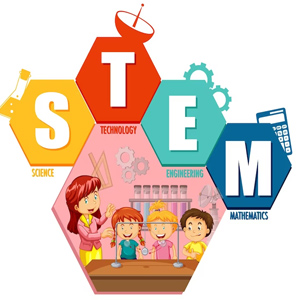Top Summer STEM Camps for Students (Updated 2023)
 Summer camps have expanded far beyond the stereotypical cabins in the woods, where campers participate in a host of outdoor activities. Modern day camps have evolved into opportunities for students to explore their own individual interests. For those children interested in science, technology, engineering, or math (STEM), summer camp can be a place to grow and develop friendships with other STEM students.
Summer camps have expanded far beyond the stereotypical cabins in the woods, where campers participate in a host of outdoor activities. Modern day camps have evolved into opportunities for students to explore their own individual interests. For those children interested in science, technology, engineering, or math (STEM), summer camp can be a place to grow and develop friendships with other STEM students.
Choosing a STEM camp can be overwhelming, given that options sometimes number in the hundreds. To help narrow the search, parents should look for summer STEM camps that have the following qualities:
- Programs that match your child's interests.
- Camps that balance classes with fun activities.
- Well-developed courses with hands-on experiences.
- Curated information on career opportunities
Emagination's summer STEM camps offer all the above features plus innovative game design sessions.
What Are Emagination STEM Camps?
Emagination offers summer STEM camps for students aged 8 to 17 with an interest in science and technology. Camps last two weeks and begin on either Sunday (for those enrolled in the overnight option) or Monday (for those enrolled in the day camper option).
Learning
A camp day begins at 8:30 am and ends at 5:30 pm. With an extended day option, day campers can arrive at 7:30 am and stay until 7:30 pm. Overnight campers will spend their evenings enjoying Wi-Fi in air-conditioned rooms or hanging out in game rooms and lounge areas. All, with staff supervision.
Campers can select classes from any of the following areas of concentration:
- Engineering includes four courses ranging from logic thinking to robotics.
- Design Art and Media has six classes covering animation and design.
- Coding offers four courses introducing in-demand languages such as Java and C#.
- Game Design provides seven classes using frameworks such as Minecraft and Dungeons & Dragons.
Students can enroll in classes in one concentration area or mix and match to create a personalized schedule. Participants receive six hours of instruction per day divided into two 3-hour sessions, each with a 45-minute break.
Locations
Our STEM camps are located on educational campuses in the following six states:
- Connecticut at Fairfield University
- Georgia at Mercer University's Atlanta Campus
- Illinois at Lake Forest Academy
- Massachusetts at Bentley University
- Pennsylvania at Rosemont College
- Virginia at Marymount University
Overnight campers experience life in a dormitory setting.
What About the Camp Part?
All of our programs are located on educational campuses. When campers are not in classes, they participate in outdoor activities such as dodgeball or water sports. In case of inclement weather, indoor activities such as board games are available.
Overnight campers can participate in ongoing activities or enjoy conversations with like-minded students. Campers can choose to spend some free time in the labs. However, our camps are designed to foster social interaction, and our staff encourages every student to participate in group activities.
How to Prepare Your Child for Camp
Preparing your child for camp depends on age and experience. Although most people think of campers as missing home when they stay overnight, children can also be apprehensive about attending a day camp. Whether your child is a day or overnight camper, talking to them about what to expect can go a long way toward easing anxieties.
Everyone gets a little anxious or nervous when faced with the unknown. Minimizing the unknowns is the best way to prepare a child for camp. How can you help your child prepare for a day camp?
Bring a Friend
If your child has a friend who shares an interest in STEM, talk to the parents to see if their child could also attend. It's not always possible, but a day camp means sharing drop-off and pick-up times. Sharing the experience with a friend makes dealing with uncertainty much easier.
Explore the Location
Take your child on a tour of the campus. If classes are in session, you may be able to visit a dorm, locate the dining hall, and find the labs. If touring the campus isn't possible, check out the institution's website. Most will have a map, and some may have a virtual tour. Staff members will be present to assist your child every step of the way, but knowing where things are located can ease anxiety.
Focus on Fun
Day campers may view the first day of camp much like the first day of a new school year, but camp is way more fun. Focus on what your child is most excited about, whether it's meeting new people or experimenting with game design.
Game Design Tech Camp
Campers interested in game design can choose up to four classes per session. They can work with different game engines and learn the fundamentals of game design. If they want, students can take classes in other areas, such as coding, to gain some programming experience. The following are courses available under the game design concentration:
- Dungeons & Dragons: Learn to create custom characters within the world of Dungeons & Dragons. Work on a team to get experience in collaborative development.
- Action Game Design: Campers learn design basics using GameMaker Studio, a complete development environment. Action Game Design presents basic 2D design theory.
- Minecraft World Design: The Minecraft gaming engine forms the basis for building a shared world. Campers navigate challenges and acquire resources.
- Strategy Game Design: Explore how to design strategy games with Warcraft 3. See how to create a multiplayer game using a Warcraft World Map.
- Unity 2D Design: Unity 2D design is an all-in-one editor with a physics library and sprite controls. Campers learn how to use storyboarding to design a microgame.
- Unreal Game Design: Unreal Game Design incorporates project management skills into the development of an Unreal game. The game includes storylines, environments, scenarios, and maps.
Why Emagination Game Design Tech Camp?
All Emagination's Summer STEM camps offer children, ages 8-17, the opportunity to explore science and technology. In our unique learning environment, our students aren’t burdened by formal educational requirements. Instead, they have the freedom to try and fail.
In the Game Design classes, students discover that mistakes can teach just as well as, if not more than, victories. They will learn the importance of collaboration and project management in game development. Most importantly, our students gain confidence in their area of interest.

